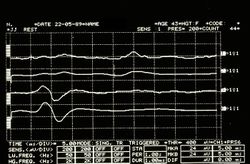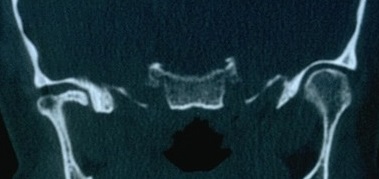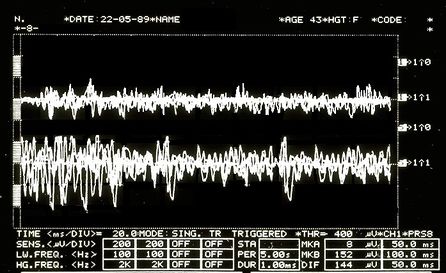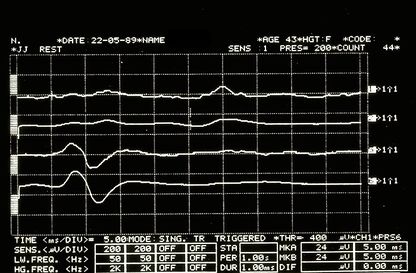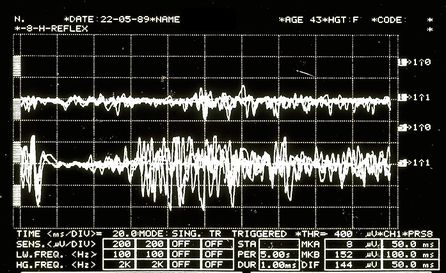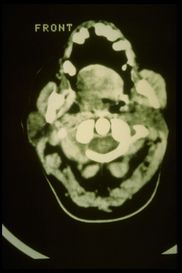Difference between revisions of "The logic of probabilistic language/es"
(Created page with "Tomamos un camino largo y tortuoso para comprender mejor la complejidad que encontró el colega que lucha con la gran responsabilidad ética de hacer un diagnóstico. Sin emba...") |
(Created page with "Aquí nos adentramos en un tema delicado, que se vincula con los contenidos epistemológicos y que en primer lugar se relató en la "Introducción"") |
||
| Line 426: | Line 426: | ||
Tomamos un camino largo y tortuoso para comprender mejor la complejidad que encontró el colega que lucha con la gran responsabilidad ética de hacer un diagnóstico. Sin embargo, esta tarea se vuelve aún más compleja cuando necesitamos ser detallados y cuidadosos al realizar un diagnóstico diferencial.. | Tomamos un camino largo y tortuoso para comprender mejor la complejidad que encontró el colega que lucha con la gran responsabilidad ética de hacer un diagnóstico. Sin embargo, esta tarea se vuelve aún más compleja cuando necesitamos ser detallados y cuidadosos al realizar un diagnóstico diferencial.. | ||
| − | + | Aquí nos adentramos en un tema delicado, que se vincula con los contenidos epistemológicos y que en primer lugar se relató en la "[[Introducción]]". We are talking about: | |
*'''Interdisciplinarity''': <br>''In science policy, it is generally recognized that science-based problem solving requires interdisciplinary research ('''IDR'''), as proposed by the EU project called Horizon 2020<ref>European Union, ''[https://ec.europa.eu/programmes/horizon2020/en/h2020-section/societal-challenges Horizon 2020]''</ref>. In a recent study, the authors focus on the question why researchers have cognitive and epistemic difficulties in conducting IDR. It is believed that the loss of philosophical interest in the epistemology of interdisciplinary research is caused by a philosophical paradigm of science called "Physics Paradigm of Science", which prevents recognition of important IDR changes in both the philosophy of science and research.<br>The proposed alternative philosophical paradigm, called 'Engineering Paradigm of Science', makes alternative philosophical assumptions about aspects such as the purpose of science, the character of knowledge, the epistemic and pragmatic criteria for the acceptance of knowledge and the role of technological tools. Consequently, scientific researchers need so-called metacognitive scaffolds to assist them in the analysis and reconstruction of how 'knowledge' is constructed in different disciplines.<br>In interdisciplinary research, metacognitive scaffolds help interdisciplinary communication analyse and articulate how the discipline builds knowledge<ref name=":0">{{cita libro | *'''Interdisciplinarity''': <br>''In science policy, it is generally recognized that science-based problem solving requires interdisciplinary research ('''IDR'''), as proposed by the EU project called Horizon 2020<ref>European Union, ''[https://ec.europa.eu/programmes/horizon2020/en/h2020-section/societal-challenges Horizon 2020]''</ref>. In a recent study, the authors focus on the question why researchers have cognitive and epistemic difficulties in conducting IDR. It is believed that the loss of philosophical interest in the epistemology of interdisciplinary research is caused by a philosophical paradigm of science called "Physics Paradigm of Science", which prevents recognition of important IDR changes in both the philosophy of science and research.<br>The proposed alternative philosophical paradigm, called 'Engineering Paradigm of Science', makes alternative philosophical assumptions about aspects such as the purpose of science, the character of knowledge, the epistemic and pragmatic criteria for the acceptance of knowledge and the role of technological tools. Consequently, scientific researchers need so-called metacognitive scaffolds to assist them in the analysis and reconstruction of how 'knowledge' is constructed in different disciplines.<br>In interdisciplinary research, metacognitive scaffolds help interdisciplinary communication analyse and articulate how the discipline builds knowledge<ref name=":0">{{cita libro | ||
Revision as of 16:53, 23 October 2021
En este capítulo, discutiremos la lógica del lenguaje junto con la probabilidad matemática.. Hemos visto que lógica clásica por sí sola es insuficiente para determinar diagnósticos precisos; por lo tanto, se ofrece una descripción general conceptual y formal de por qué la probabilidad puede ser muy útil.. Incluyendo ilustraciones de casos de casos clínicos, veremos cómo la lógica del lenguaje probabilístico es capaz de proporcionarnos un diagnóstico diferencial de una manera "suficientemente buena"..
La conclusión es que es posible demostrar que, incluso con la sola adición del razonamiento probabilístico, no es posible determinar diagnósticos exactos, por lo que se buscan otros enriquecimientos para nuestro lenguaje..
Lógica probabilística del lenguaje en medicina
Toda idea científica (ya sea en medicina, arquitectura, ingeniería, química o cualquier otra materia), cuando se pone en práctica, está sujeta a pequeños errores e incertidumbres.. Las matemáticas, a través de la teoría de la probabilidad y la inferencia estadística, ayudan a controlar con precisión y, por lo tanto, a contener estas incertidumbres.. Siempre hay que tener en cuenta que en todos los casos prácticos "los resultados también dependen de muchos otros factores externos a la teoría", ya sean condiciones iniciales y ambientales, errores experimentales u otra cosa..
Todas las incertidumbres sobre estos factores hacen que la relación teoría-observación sea probabilística. En el enfoque médico, hay dos tipos de incertidumbre que más pesan en los diagnósticos: la incertidumbre subjetiva y la casualidad..[1][2]
Por lo tanto, en este escenario resulta esencial distinguir entre estas dos incertidumbres y mostrar que el concepto de probabilidad tiene significados diferentes en estos dos contextos..
Intentaremos exponer estos conceptos vinculando cada paso crucial con el enfoque clínico que se ha informado en los capítulos anteriores y, en particular, el enfoque en el contexto dental y neurológico en la lucha por la primacía del diagnóstico para nuestra querida Mary Poppins..
Incertidumbre subjetiva y siniestro
Imaginemos preguntarle a Mary Poppins cuál de los dos colegas médicos - el dentista o el neurólogo - tiene razón..
La pregunta crearía una especie de agitación basada en la incertidumbre interior; por tanto, las nociones de certeza e incertidumbre se refieren a estados epistémicos subjetivos del ser humano y no a estados del mundo externo, porque no hay certeza ni incertidumbre en ese mundo. En este sentido, como hemos mencionado, hay un mundo interior y un mundo fuera de nosotros que ambos no responden a cánones de incertidumbre, pero sí de probabilidad.
Mary Poppins puede estar subjetivamente segura o insegura de si sufre de TMD o una forma neuropática o neuromuscular de OP: esto porque la "incertidumbre" es un estado epistémico subjetivo por debajo del umbral del conocimiento y la creencia; de ahí el término.
Incertidumbre subjetiva
Sin duda, el término "subjetivo" asusta a muchos, especialmente a aquellos que tienen la intención de practicar la ciencia persiguiendo el ideal saludable de la "objetividad", como este término es percibido por el sentido común. Por tanto, conviene hacer algunas aclaraciones sobre el uso de este término en este contexto.:
- ‘Subjetivo’ indica que la evaluación de la probabilidad depende del estado de la información de la persona que la realiza.
- ‘Subjetivo’ No significa arbitrario.
La llamada "objetividad", tal como la perciben quienes están fuera de la investigación científica, se define cuando una comunidad de seres racionales comparte el mismo estado de información. Pero incluso en este caso, se debería hablar más propiamente de "intersubjetividad" (es decir, el intercambio, por un grupo, de opiniones subjetivas).
En los casos clínicos - precisamente porque los pacientes rara vez poseen nociones avanzadas de medicina - debe tenerse en cuenta la incertidumbre subjetiva. Vivir con incertidumbre requiere que usemos un enfoque probabilístico.
Casualidad
La casualidad indica la falta de una cierta conexión entre causa y efecto. La incertidumbre de una estrecha unión entre la fuente y el fenómeno es uno de los problemas más adversos para determinar un diagnóstico.
En un caso clínico, un fenómeno (como por ejemplo una maloclusión, una mordida cruzada, una mordida abierta, etc.) se asocia aleatoriamente con otro fenómeno Failed to parse (syntax error): {\displaystyle B (x) < / math> (como la degeneración ósea de la ATM); cuando hay excepciones para las cuales la proposición lógica <math> A (x) \ rightarrow B (x) } no siempre es cierta (pero lo es la mayor parte del tiempo), diremos que la relación no siempre es cierto pero es probable.
Probabilidad subjetiva y objetiva
En este capítulo, algunos temas ya tratados en el fantástico libro de Kazem Sadegh-Zadeh[3], quienes abordan el problema de la lógica del lenguaje médico, son retomados y remodelamos su contenido remitiéndolos a nuestro caso clínico de Mary Poppins, para acercar nuestra comprensión a los contextos dentales.
Se dice que los sucesos aleatorios y subjetivamente inciertos son probables; en consecuencia, la casualidad y la incertidumbre se tratan como probabilidades cualitativas, comparativas o cuantitativas.
Para aclarar este concepto, volvamos al ejemplo de Mary Poppins. Un médico, habiendo escuchado sus síntomas, podrá decir que:
- Mary Poppins probablemente sufre de TMD (término cualitativo).
- Mary Poppins tiene más probabilidades de tener TMD que OP neuropático (término comparativo: número de casos diagnosticados de TMD versus n OP.
- La probabilidad de que Mary Poppins tenga TMD es de 0,15 (término cuantitativo, relativo a la población).
Probabilidad subjetiva
En un contexto de incertidumbre subjetiva humana, los datos probabilísticos, cualitativos, comparativos y / o cuantitativos pueden ser interpretados por el médico como una medida de incertidumbre subjetiva, con el fin de hacer que los 'estados de convicción' sean numéricamente representables..
Por ejemplo, decir que "la probabilidad de que Mary Poppins se vea afectada por TMD es de 0,15 de los casos" es lo mismo que decir "en la medida del 15%, creo que Mary Poppins está afectada por TMD"; lo que significa que el grado de convicción es el grado de probabilidad subjetiva.
Probabilidad objetiva
Por otro lado, los eventos y los procesos aleatorios no pueden describirse mediante procesos deterministas en la forma "si A entonces B". Las estadísticas se utilizan para cuantificar la frecuencia de asociación entre A y B y para representar las relaciones entre ellos como un grado de probabilidad que introduce el grado de probabilidad objetiva.
A raíz de la creciente probabilización de la incertidumbre y la aleatoriedad en la medicina desde el siglo XVIII, el término "probabilidad" se ha convertido en un elemento respetado del lenguaje, la metodología y la epistemología médicos.
Desafortunadamente, los dos tipos de probabilidad, la probabilidad subjetiva y la objetiva, no se diferencian con precisión en la medicina, y lo mismo ocurre también en otras disciplinas. El hecho fundamental sigue siendo que el significado más importante que la teoría de la probabilidad ha generado en la medicina, particularmente en los conceptos de probabilidad en etiología, epidemiología, diagnóstico y terapia, es su contribución a nuestra comprensión y representación de la casualidad biológica.
Análisis probabilístico-causal
A partir de estas premisas se desprende que el diagnóstico clínico se realiza mediante el llamado método hipotético-deductivo denominado DN[4] (deductive-nomological model[5]). Pero esto no es realista, ya que el conocimiento médico utilizado en la toma de decisiones clínicas difícilmente contiene leyes deterministas causales que permitan explicaciones causales y, por ende, formular diagnósticos clínicos, entre otras cosas en el contexto de especialistas. Intentemos analizar nuevamente el caso de nuestras Mary Poppins, esta vez con un enfoque probabilístico-causal.
Consideremos un número de personas, incluidas las personas que informan de dolor orofacial que generalmente tienen degeneración ósea de la articulación temporomandibular. Sin embargo, también puede haber otras causas aparentemente no relacionadas. Debemos traducir matemáticamente la "relevancia" que tienen estas incertidumbres causales a la hora de determinar un diagnóstico.
La relevancia casual
Para hacer esto, consideramos el grado de relevancia causal de un evento con respecto a un evento donde:
- = pacientes con degeneración ósea de la articulación temporomandibular.
- = pacientes que informan dolor orofacial.
- = pacientes sin degeneración ósea de la articulación temporomandibular.
Usaremos la probabilidad condicional , que es la probabilidad de que el evento ocurra solo después de que el evento haya ya ocurrió.
Con estas premisas la relevancia causal de la muestra de pacientes es:
dónde
- indica la probabilidad de que algunas personas (entre consideradas) sufran dolor orofacial causado por la degeneración ósea de la articulación temporomandibular,
mientras
- indica la probabilidad de que otras personas (siempre entre consideradas) sufran de Dolor Orofacial condicionado por algo diferente a la degeneración ósea de la Articulación Temporomandibular.
Dado que toda probabilidad sugiere que es un valor entre y , el parámetro Failed to parse (syntax error): {\displaystyle (cr) < / math> será un número entre <math> -1 } y .
Los significados que podemos darle a este número son los siguientes:
- tenemos los casos extremos (que en realidad nunca ocurren) que son:
- lo que indica que la única causa de dolor orofacial es la degeneración ósea de la ATM,
- lo que indica que la causa del dolor orofacial nunca es la degeneración ósea de la ATM, sino otra cosa,
- lo que indica que la probabilidad de que el dolor orofacial sea causado por la degeneración ósea de la ATM o de otro modo es exactamente la misma,
- y los casos intermedios (que son los realistas)
- lo que indica que la causa del dolor orofacial es más probable que sea la degeneración ósea de la ATM,
- lo que indica que la causa del dolor orofacial es más probable que no sea la degeneración ósea de la ATM.
Segundo abordaje clínico
(pasar el cursor sobre las imágenes)
Sea entonces la probabilidad de encontrar, en la muestra de nuestras personas, individuos que presenten los elementos pertenecientes al conjunto mencionado Failed to parse (syntax error): {\displaystyle D = \ {\ delta_1, \ delta_2, ..., \ delta_n \} }
Para aprovechar la información proporcionada por este conjunto de datos, se introduce el concepto de partición de relevancia causal.:
La partición de la relevancia causal
- Sea siempre la cantidad de personas sobre las que tenemos que realizar los análisis, si dividimos (según ciertas condiciones, como se explica a continuación) este grupo en subconjuntos con , se crea un clúster que se denomina "conjunto de particiones" :
donde con el simbolismo indica que la subclase está contenida en .
La partición , para que se defina como una partición de relevancia causal, debe tener estas propiedades:
- Para cada subclase se debe aplicar la condición es decir, la probabilidad de encontrar en el subgrupo una persona que presenta los síntomas, signos clínicos y elementos pertenecientes al conjunto Failed to parse (syntax error): {\displaystyle D = \ {\ delta_1, \ delta_2, ..., \ delta_n \} } . Se dice que una partición causalmente relevante de este tipo es 'homogénea' .
- Cada subconjunto debe ser 'elemental', es decir, no debe dividirse en otros subconjuntos, porque si estos existieran no tendrían relevancia causal..
Supongamos ahora, por ejemplo, que la muestra de población , a la que pertenece nuestra buena paciente Mary Poppins, es una categoría de sujetos de 20 a 70 años. También suponemos que en esta población tenemos aquellos que presentan los elementos pertenecientes al conjunto de datos Failed to parse (syntax error): {\displaystyle D = \ {\ delta_1, ..... \ delta_n \} } que corresponden a las pruebas de laboratorio mencionadas anteriormente y precisan en 'La lógica del clásico idioma'.
Supongamos que en una muestra de 10,000 sujetos de 20 a 70 tendremos una incidencia de 30 sujetos mostrando signos clínicos y . Preferimos utilizar estos informes para la demostración del proceso probabilístico porque en la literatura los datos sobre los signos y síntomas clínicos de los trastornos temporomandibulares tienen una variación demasiado amplia y una incidencia demasiado alta en nuestra opinión..[6][7][8][9][10][11]
Un ejemplo de una partición con presunta probabilidad en la que la degeneración de la ATM (Deg.TMJ) ocurre junto con los trastornos temporomandibulares (TMD) sería el siguiente:
| dónde | |||||
| dónd | |||||
| dónde | |||||
| dónde |
Situaciones clínicas
Estas probabilidades condicionales demuestran que cada una de las cuatro subclases de la partición es causalmente relevante para los datos del paciente Failed to parse (syntax error): {\displaystyle D = \ {\ delta_1, ..... \ delta_n \} } en la muestra de población Failed to parse (syntax error): {\displaystyle PO </ math>. Dada la partición antes mencionada de la clase de referencia, tenemos las siguientes situaciones clínicas: *Mary Poppins <math> \ in } degeneración de la articulación temporomandibular Trastornos temporomandibulares
- Mary Poppins degeneración de la articulación temporomandibular sin trastornos temporomandibulares
- Mary Poppins sin degeneración de la articulación temporomandibular Trastornos temporomandibulares
- Mary Poppins sin degeneración de la articulación temporomandibular sin trastornos temporomandibulares
Para llegar al diagnóstico final anterior, realizamos un análisis probabilístico-causal del estado de salud de Mary Poppins, cuyos datos iniciales fueron Failed to parse (syntax error): {\displaystyle D = \ {\ delta_1, ..... \ delta_n \} } .
En general, podemos referirnos a un proceso lógico en el que examinamos los siguientes elementos:
- un individuo:
- su conjunto de datos inicial
- una muestra de población a la que pertenece,
- una probabilidad base
En este punto deberíamos introducir argumentos demasiado especializados que desviarían al lector del tema pero que tienen una alta importancia epistémica por lo que intentaremos extraer el hilo lógico más descrito del concepto Analysandum / Analysans..
El análisis probabilístico-causal de Failed to parse (syntax error): {\displaystyle D = \ {\ delta_1, ..... \ delta_n \} } es entonces un par de las siguientes formas lógicas (Analysandum / Analysans[12]):
- 'Analysandum 'Failed to parse (syntax error): {\displaystyle = \ {P (D), a \} } : es una forma lógica que contiene dos parámetros:' 'probabilidad' ' para seleccionar una persona que tiene los síntomas y elementos pertenecientes al conjunto Failed to parse (syntax error): {\displaystyle D = \ {\ delta_1, \ delta_2, ..., \ delta_n \} } , y el individuo genérico que es propenso a esos síntomas.
- 'Analysan Failed to parse (syntax error): {\displaystyle = \ {\ pi, a, KB \} } ': es una forma lógica que contiene tres parámetros: la' 'partición' ', la' 'individuo genérico' ' perteneciente a la muestra de población y' ' (Knowledge Base)' 'que incluye un conjunto de > n> 1 </math> enunciados de probabilidad condicionada.
Por ejemplo, se puede concluir que el diagnóstico definitivo es el siguiente:
- esto significa que nuestra Mary Poppins está 95% afectada por TMDs, ya que tiene una degeneración de la Articulación Temporomandibular además de los datos positivos
Final considerations
Tomamos un camino largo y tortuoso para comprender mejor la complejidad que encontró el colega que lucha con la gran responsabilidad ética de hacer un diagnóstico. Sin embargo, esta tarea se vuelve aún más compleja cuando necesitamos ser detallados y cuidadosos al realizar un diagnóstico diferencial..
Aquí nos adentramos en un tema delicado, que se vincula con los contenidos epistemológicos y que en primer lugar se relató en la "Introducción". We are talking about:
- Interdisciplinarity:
In science policy, it is generally recognized that science-based problem solving requires interdisciplinary research (IDR), as proposed by the EU project called Horizon 2020[13]. In a recent study, the authors focus on the question why researchers have cognitive and epistemic difficulties in conducting IDR. It is believed that the loss of philosophical interest in the epistemology of interdisciplinary research is caused by a philosophical paradigm of science called "Physics Paradigm of Science", which prevents recognition of important IDR changes in both the philosophy of science and research.
The proposed alternative philosophical paradigm, called 'Engineering Paradigm of Science', makes alternative philosophical assumptions about aspects such as the purpose of science, the character of knowledge, the epistemic and pragmatic criteria for the acceptance of knowledge and the role of technological tools. Consequently, scientific researchers need so-called metacognitive scaffolds to assist them in the analysis and reconstruction of how 'knowledge' is constructed in different disciplines.
In interdisciplinary research, metacognitive scaffolds help interdisciplinary communication analyse and articulate how the discipline builds knowledge[14][15]
This concept is linked to the previously discussed topic in which the colleague should be aware of his own 'Subjective Uncertainty' (due to a classic logic language 'sick or healthy') and of 'Objective Uncertainty' (due to a probabilistic logic language 'probably sick or probably healthy'). It is not complicated to prove this assertion: the uncertainty we are talking about derives from the fact that the elements, assertions, data, classes and subclasses mentioned and that build the apparatus of the logic of probabilistic's language: Analysandum and Analysan are elements that exist in a specific world, and in this case in a dental context in which the element of the process indisputably indicates a "basic knowledge" only in a specific dental context.
This conclusion confirmed by the dentist was the following:
or better: it is my 95% belief that Mary Poppins is affected by TMDs since she has a degeneration of the temporomandibular joint in addition to the positivity of the data
But something strange happens because out of nowhere, a researcher, who uses 'metacognitive scaffolds'[16] for an implementation in the analysis and reconstruction of how 'knowledge' is built in different disciplines, demands an answer to the following question from the dentist:
and increase the dose: submit Mary Poppins to the following trigeminal electrophysiological tests, label them as we did previously for the set data generating another set containing a number of unknown data (not belonging to the purely dental branch) thereby creating an entirely new set that we will call (called precisely due to the presence of data unknown to the dental context).
Positive radiological report of the TMJ in Figure 2
Positive CT report of the TMJ in Figure 3
Positive axiographic report of the condylar traces in Figure 4
Asymmetric EMG interference pattern in Figure 5
Jaw jerk in Figure 6
Mechanical Silent Period in Figure 7
CT right masseter muscle in Figure 8
Third Clinical Approach
(hover over the images)
In this way it has been shown that, inevitably,
By exploring this perimeter line of the specialist context, we will create an area close to it which we will call the 'fuzzy zone' or 'fuzzy logic' which we will discuss in the next chapter.
(in fact, for this reason we should also consider Fuzzy Logic Language)
- ↑ Vázquez-Delgado E, Cascos-Romero J, Gay-Escoda C, «Myofascial pain associated to trigger points: a literature review. Part 2: differential diagnosis and treatment», in Med Oral Patol Oral Cir Bucal, 2007.
PMID:20173729
DOI:10.4317/medoral.15.e639 - ↑ Thoppay J, Desai B, «Oral burning: local and systemic connection for a patient-centric approach», in EPMA J, 2019.
PMID:30984309 - PMCID:PMC6459460
DOI:10.1007/s13167-018-0157-3 - ↑ Sadegh-Zadeh Kazem, «Handbook of Analytic Philosophy of Medicine», Springer, 2012, Dordrecht.
ISBN: 978-94-007-2259-0
DOI:10.1007/978-94-007-2260-6 . - ↑ Sarkar S, «Nagel on Reduction», in Stud Hist Philos Sci, 2015.
PMID:26386529
DOI:10.1016/j.shpsa.2015.05.006 - ↑ Modelo DN de explicación científica, también conocido como Modelo de Hempel, Hempel–Oppenheim model, Popper–Hempel model, o modelo de ley de cobertura
- ↑ Pantoja LLQ, De Toledo IP, Pupo YM, Porporatti AL, De Luca Canto G, Zwir LF, Guerra ENS, «Prevalence of degenerative joint disease of the temporomandibular joint: a systematic review», in Clin Oral Investig, 2019.
PMID:30311063
DOI:10.1007/s00784-018-2664-y - ↑ De Toledo IP, Stefani FM, Porporatti AL, Mezzomo LA, Peres MA, Flores-Mir C, De Luca Canto G, «Prevalence of otologic signs and symptoms in adult patients with temporomandibular disorders: a systematic review and meta-analysis», in Clin Oral Investig, 2017.
PMID:27511214
DOI:10.1007/s00784-016-1926-9 - ↑ Bonotto D, Penteado CA, Namba EL, Cunali PA, Rached RN, Azevedo-Alanis LR, «Prevalence of temporomandibular disorders in rugby players», in Gen Dent.
PMID:31355769 - ↑ da Silva CG, Pachêco-Pereira C, Porporatti AL, Savi MG, Peres MA, Flores-Mir C, De Luca Canto G, «Prevalence of clinical signs of intra-articular temporomandibular disorders in children and adolescents: A systematic review and meta-analysis», in Am Dent Assoc, 2016. - PMCID:26552334
DOI:10.1016/j.adaj.2015.07.017 - ↑ Gauer RL, Semidey MJ, «Diagnosis and treatment of temporomandibular disorders», in Am Fam Physician, 2015.
PMID:25822556 - ↑ Kohlmann T, «Epidemiology of orofacial pain», in Schmerz, 2002.
PMID:12235497
DOI:10.1007/s004820200000 - ↑ Westmeyer H, «The diagnostic process as a statistical-causal analysis», in APA, 1975.
DOI:10.1007/BF00139821
This is an Open Access resource - ↑ European Union, Horizon 2020
- ↑ Boon M, Van Baalen S, «Epistemology for interdisciplinary research - shifting philosophical paradigms of science», in Eur J Philos Sci, 2019.
DOI:10.1007/s13194-018-0242-4 9(1):16. - ↑ Boon M, «An engineering paradigm in the biomedical sciences: Knowledge as epistemic tool», in Prog Biophys Mol Biol, 2017.
DOI:10.1016/j.pbiomolbio.2017.04.001 - ↑ Boon M, Van Baalen S, «Epistemology for interdisciplinary research - shifting philosophical paradigms of science», in Eur J Philos Sci, 2019.
PMID:30873248 - PMCID:PMC6383598
DOI:10.1007/s13194-018-0242-4
This is an Open Access resource
particularly focusing on the field of the neurophysiology of the masticatory system
